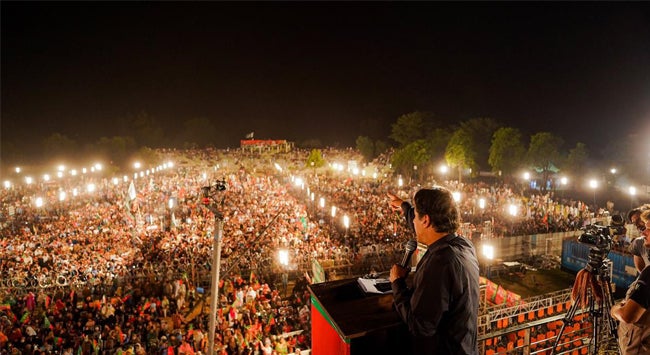Summary
This paper looks at the massive crowds attending former Pakistan Prime Minister Imran Khan’s rallies who are virtually in revolt against the elitist-led system. He faces a historic choice: lead his supporters in a movement to reform the system or just use them for his political ambitions.
The massive crowds attending Pakistan’s former Prime Minister Imran Khan’s ongoing rallies is an old yet new phenomenon. Similar mobilisation by other political leaders has happened before, but it lacked the spontaneity, fervour and diversity of the present gatherings. The good news is that Khan’s supporters may have shown the first tangible signs in Pakistan of the population’s initiative to organise for political action. However, the bad news is that the people are coming out for the wrong cause – more than Pakistan, they care about Khan.
By stoking long-standing public anger and feelings of injustice at the hands of the country’s established political leadership, and a sense of victimhood, incited by America’s post 9/11 wars, Khan has evoked powerful emotions of morality, nationalism and religion. He said what his base wanted to hear but made them believe that these were his own views, thus creating an illusion that he spoke for them. If he loses, they lose.
For his Supporters, Khan has become the Cause
Khan’s campaign typically carries the hallmark of a cult seeking unquestioned devotion to the leader who is to be trusted to take his followers blindly into whatever direction. The leader has the charisma and the ability to tap into the people’s grievances and aspirations, exchange hope for idolisation, and bond with them. The tragedy is the leader then becomes the cause.
As they say, campaigns are poetry and governing is prose. Khan’s governing had remained a poetry, and a bad one at that. His diagnosis of issues was naïve, and solutions simplistic. His vision was not about the future but the past. He was too self-absorbed to understand Pakistan’s challenges, nor did he try. Instead, he lived by his obsessions.
Khan claims that he has been removed because of his “independent” foreign policy, without offering convincing proof, has pointed the finger of blame at Washington for conspiring his ouster. The fact is the foreign policy does not become independent just because it is anti-American. Moreover, what good is this “independent” foreign policy if it is a bad policy, like the support for the Taliban celebrated by him for having “broken the shackles of slavery”.
Whatever Khan may say, for all its faults, America had not enslaved Afghanistan, nor are the Taliban liberators. And about the overtures to Russia, which he also highlighted as a feature of his “independent” foreign policy – these did not happen under his watch. Pakistan had been seeking friendly ties with Moscow for decades as part of its efforts to diversify its relations with the big powers. The only thing “independent” was the timing of Khan’s Moscow visit, and it turned out to be wrong. Pakistan has not been enslaved by any foreign power either, as claimed by Khan, but by its own elitist system, the same system that brought him to power and which he neither accepted nor repudiated. In the end, he did not leave the system; it left him.
Need to Reform the System
There is no alternative but to reform the system. And to be fair to Khan’s supporters, they may have a role to play here. In a country that has not seen a revolution, national resistance, protracted conflict, social movement or an extraordinary leader, which are the usual levers of historical changes in society, his supporters’ political activism may be the next best thing to an instrument of change.
Pakistan needs an open and stable political process that promotes liberal habits of the mind and supports gender equality and justice for all, not only for the citizenry, regardless of the class, but also for the smaller provinces and minorities. There is also the need for a better economic deal for the poor. For all this, Pakistan needs to initiate major socio-economic reforms and ensure inclusive economic growth, human resource development and openness to the global economy. This is a gigantic task and cannot be accomplished by believing in conspiracy theories and empty rhetoric. Khan’s supporters will do well not to look upon him as a cult leader or heroic figure. This will only pander to his vanity and egoism fuelling his sense of infallibility and leading to ignorance and misguided action.
A Reform Movement?
Khan’s supporters can be the precursor of a movement that can help create an awareness of the serious challenges Pakistan faces, and generate a mass awakening. Given his integrity and intensity of purpose, Khan can be more useful as the head of this movement than as a government leader, where he may have to compromise with the system, yet again. Whatever path he chooses, Khan must act as an informed leader dedicated to Pakistan, not to himself. Otherwise, Pakistan will lose and so will his supporters.
Pakistan has enormous strengths – remarkable resilience, faith-based optimism, a sense of exceptionalism, a vibrant media and a promising civil society. And functioning institutions. Can Pakistan do it? Yes, it can. Whether it will, is arguable. A well-entrenched system is difficult to reform through a normal democratic process, specially one resting on serious power imbalances and in-equilibrium between reform and resistance.
. . . . .
Professor Touqir Hussain is a Visiting Senior Research Fellow at the Institute of South Asian Studies (ISAS), an autonomous research institute at the National University of Singapore. He is a former Ambassador of Pakistan and Diplomatic Adviser to the Prime Minister of Pakistan. He can be contacted at th258@georgetown.edu. The author bears full responsibility for the facts cited and opinions expressed in this paper.
Photo Credit: Imran Khan’s Twitter
-
 More From :
More From :
-
 Tags :
Tags :
-
 Download PDF
Download PDF



